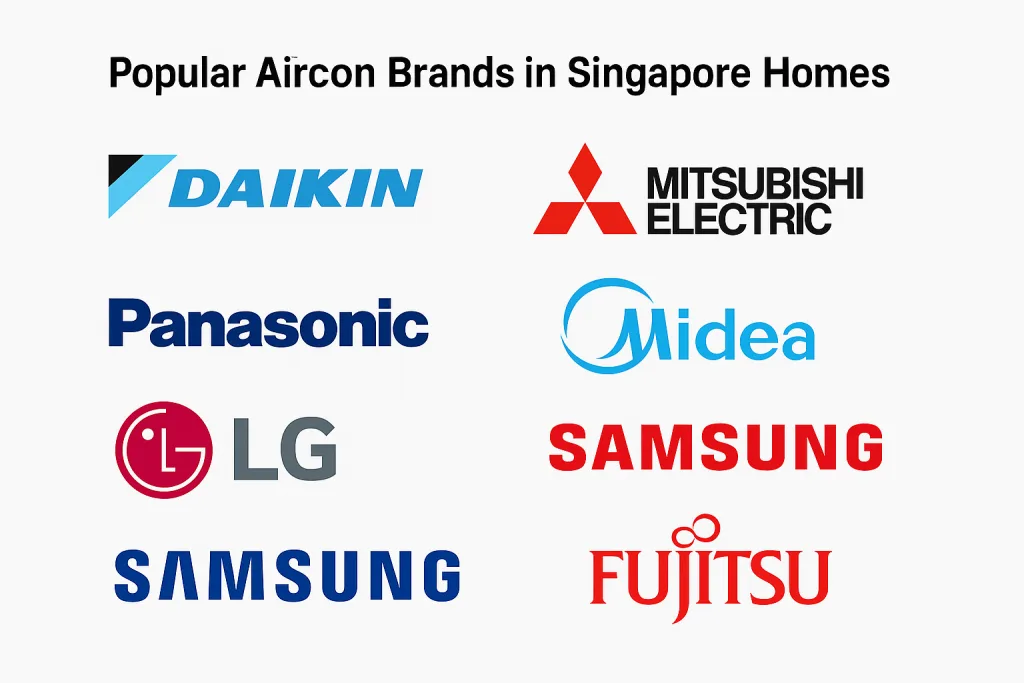Popular Aircon Brands in Singapore Homes (2025 Guide)

1. Introduction
Choosing the right air conditioner brand in Singapore isn’t just about comfort — it’s a long-term investment. With the country’s humid climate and nearly year-round usage, reliability, efficiency, and service support matter more than flash. This guide compares the most common aircon brands you’ll find across Singapore homes and HDB flats.
2. Singapore Context
Singapore’s air conditioning market is dominated by a handful of Japanese and Korean brands known for tropical durability. NEA’s Minimum Energy Performance Standards (MEPS) and energy labeling scheme have also pushed manufacturers to offer higher-efficiency inverter systems.
Common installation setups include System 1 to System 4 split units, depending on household size and number of rooms.
3. Why It Matters
Choosing a well-established brand ensures:
- Better energy savings
- Easier access to replacement parts
- Reliable after-sales service
- Higher resale value for property units with installed systems
4. The Most Common Aircon Brands in Singapore
1. Daikin
Arguably the most recognized brand in Singapore, Daikin offers a wide range of inverter split systems ideal for HDBs and condos.
- Strengths: Reliable cooling, quiet operation, excellent local support
- Popular Models: Daikin iSmile Series, Multi-Split Inverter Systems
- Warranty: Up to 5 years on compressor
2. Mitsubishi Electric
Known for durability and low noise levels, Mitsubishi Electric remains a favorite for homeowners who prioritize longevity.
- Strengths: Energy-efficient, sleek design, long lifespan
- Popular Models: Starmex Series
- Note: Widely supported by third-party service providers
3. Panasonic
Panasonic’s aircon systems are prized for strong air purification features, making them a top choice for families.
- Strengths: Nanoe™ X air purification, reliability
- Popular Models: Aero Series, Deluxe Inverter Series
4. Midea
Midea has gained traction as a more affordable option with decent performance, especially for rental properties.
- Strengths: Budget-friendly, compact units, quick installation
- Trade-offs: Slightly higher noise levels
5. LG
LG’s air conditioners combine stylish aesthetics with smart features like Wi-Fi control and smart diagnosis.
- Strengths: Smart connectivity, quiet operation
- Popular Models: LG Dual Inverter Series
6. Samsung
Samsung has invested heavily in inverter and smart-home integrated systems.
- Strengths: Energy-efficient, smart controls, good for modern apartments
- Popular Models: Wind-Free Inverter Series
7. Toshiba
A steady performer, Toshiba is known for efficient compressors and quiet cooling — ideal for bedrooms.
- Strengths: Long-lasting reliability, low maintenance
- Popular Models: Inverter Multi-Split Systems
8. Fujitsu
Less common but growing in presence, Fujitsu models are efficient and durable under Singapore’s humidity.
- Strengths: Solid engineering, compact design
- Popular Models: Fujitsu ASTG Series
5. Step-by-Step: How Homeowners Usually Choose
- Check BTU requirements – based on room size.
- Compare energy labels – 5-tick systems cost less to run.
- Assess after-sales support – local presence matters.
- Request transparent installation quotes – including copper pipe, trunking, and warranty.
6. DIY vs Professional Advice
DIY research is useful, but installation and system pairing (especially for multi-split systems) require professional guidance. A trained installer ensures correct refrigerant levels and optimal efficiency.
7. Signs It’s Time to Change Brands or Upgrade
- Frequent breakdowns or water leaks
- Noisy compressor even after cleaning
- Rising electricity bills
- Limited parts availability for older models
8. Efficiency & Lifestyle Benefits
- Quieter operation and cleaner air
- Wi-Fi control for remote cooling
- Energy savings with inverter technology
- Smart diagnostics and predictive maintenance features
9. Cost Overview in Singapore (2025)
| Brand | System 1 (SGD) | System 3 (SGD) | System 4 (SGD) |
|---|---|---|---|
| Daikin | 950–1,200 | 2,800–3,600 | 3,500–4,500 |
| Mitsubishi Electric | 1,000–1,300 | 2,900–3,700 | 3,800–4,800 |
| Panasonic | 900–1,100 | 2,600–3,400 | 3,300–4,300 |
| LG / Samsung | 850–1,050 | 2,400–3,200 | 3,000–4,000 |
| Midea | 700–900 | 2,000–2,800 | 2,700–3,600 |
10. Key Benefits Summary
| Category | Best Brand |
|---|---|
| Reliability | Daikin / Mitsubishi Electric |
| Air Purification | Panasonic |
| Smart Features | LG / Samsung |
| Budget | Midea |
| Quietness | Toshiba / Fujitsu |
11. FAQ
Q1: Which brand lasts the longest in Singapore conditions?
Daikin and Mitsubishi Electric are widely regarded for 10–15 years of lifespan with regular servicing.
Q2: Are budget brands like Midea reliable?
Yes, for light use or rental homes. For daily, long-hour use, premium brands hold up better.
Q3: Which brand is easiest to service?
Daikin, Mitsubishi, and Panasonic have strong local service networks.
Q4: Should I mix brands for multi-split systems?
No, always use the same brand for all indoor units to ensure compatibility.
Q5: Does the brand affect servicing cost?
Slightly. Premium models might require specialized parts, but the difference is small for basic maintenance.
12. Conclusion
Every brand has its niche: Daikin for reliability, Panasonic for health-conscious cooling, and LG or Samsung for tech-driven comfort. Your ideal system depends on your priorities—budget, room size, and maintenance habits.
For trusted advice and professional aircon servicing in Singapore, visit ACX WORKS — your local experts in aircon cleaning and maintenance.

